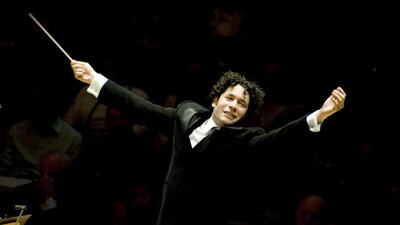Critics and audiences the world over have lined up to heap praise on the conductor Gustavo Dudamel. On Monday, Abu Dhabi audiences will finally get to hear what all the fuss is about. Following sell-out successes across the world, the 32-year-old Venezuelan will be conducting the equally feted Simón Bolívar Symphony Orchestra at Emirates Palace, in a programme including the overtures to Tchaikovsky’s The Tempest and Romeo and Juliet and Beethoven’s Fifth Symphony.
Your style of conducting with the Simón Bolívar Symphony Orchestra has been praised for being more accessible. Do you agree with such assessments?
I don’t think my way of conducting is anything special, but it is my connection with the players in my orchestra that is so important and makes us so unique. We’re a family. I spend more than 20 weeks per year in Venezuela still working with my orchestra and have plans to increase this in the coming seasons. I believe deeply in our social project and it still forms the centrepiece of my work. What I want to transmit with this performance is that our form of music-making should not have barriers to access and that it should be available to everyone. I hope it works.
What can Abu Dhabi audiences expect from the Emirates Palace performance?
We’re bringing some of our favourite repertoire to the UAE. Tchaikovsky is something that the young people in the programme in Venezuela learn almost from the very first moment. You’ll be amazed to hear a Tchaikovsky Pathétique symphony played by 6-year-olds, but it happens in Venezuela. It’s in our blood and although there is a view that only the Europeans can produce and enjoy [classical music], we believe it is for all of humanity to have this right.
Do you think your success breaks the stereotype of conductors being all rather older and in their mid-50s?
There are so many wonderful young conductors in the world today that I do not think it is my position to say this, but yes, there does seem to be a generational shift and luckily this happens all of the time, otherwise, we would not regularly have any new inspiration in the world.
What would you advise a young aspiring musician from the UAE to focus on: their passion for the instrument, their love to lead a creative orchestra or their desire to compose original music?
In Venezuela we encourage what is right for the individual, but even more so what is right for the group. So having an instrument is certainly a basis for becoming a successful conductor or composer, but it is by no means essential. First, it is important to learn to work together. An orchestra is such an amazing organism. The children playing in the orchestra learn to communicate, they learn discipline, they learn to work with each other in harmony, all while producing something incredibly beautiful.
In your experience and discussions with fellow artists, where does Abu Dhabi figure in the classical musical map?
What I find so exciting about Abu Dhabi is that it’s a place where many people would not normally think a strong European classical music movement would have a chance. Surprisingly, many people also think that about South America and about Venezuela in particular. I’m out to change that perception in the world. So I am positive this is going to be an exciting match for this performance.
Gustavo Dudamel and the Simón Bolívar Symphony Orchestra perform at Emirates Palace on Monday. Tickets are now sold out. For more from the interview with Dudamel, go to the Arts&Life blog Scene&Heard. Visit www.gustavodudamel.com and www.simonbolivarorchestra.com for more information


